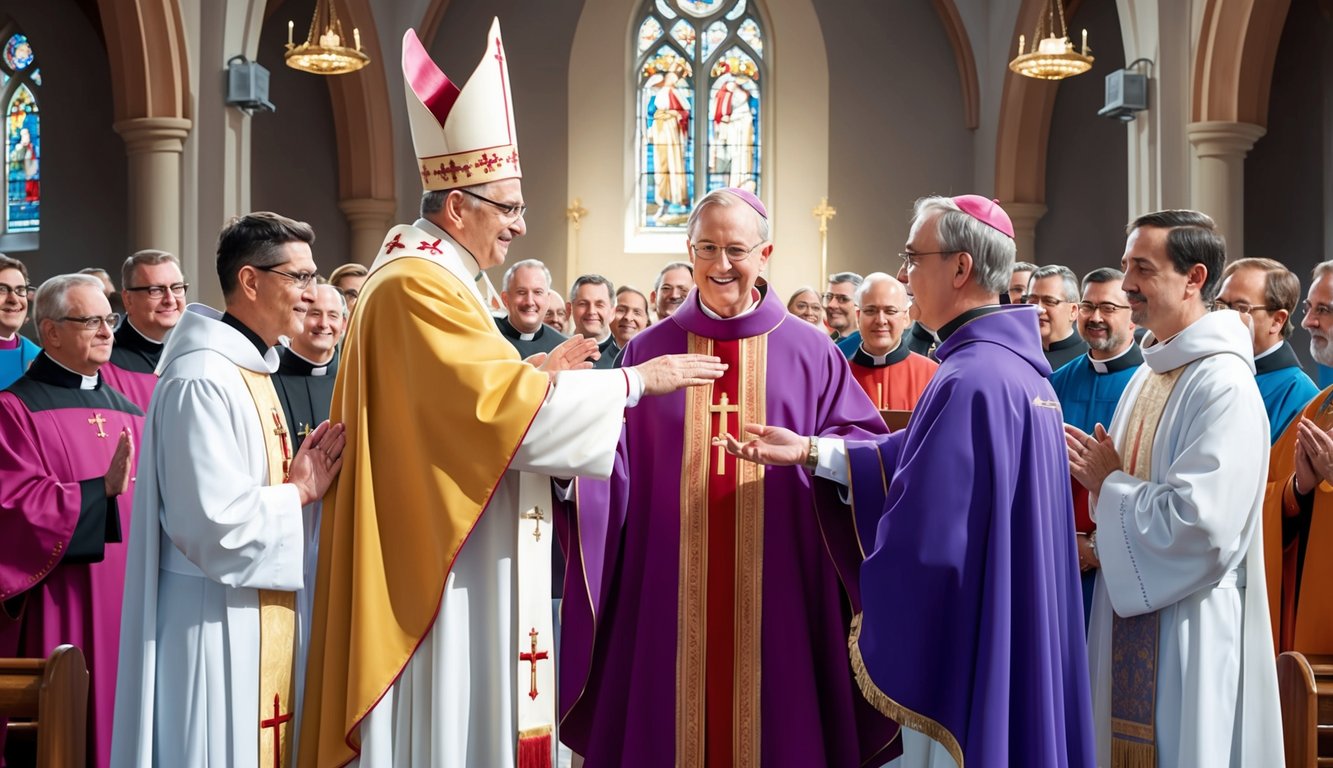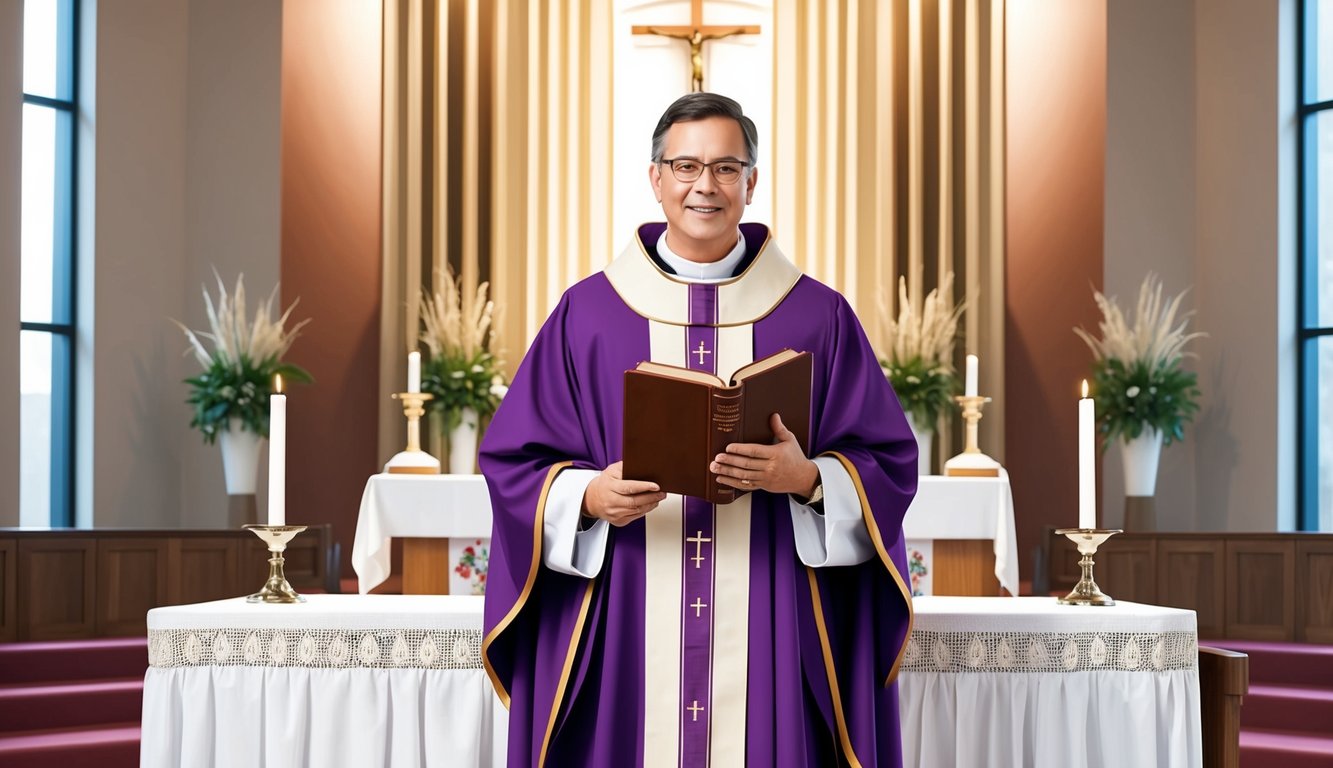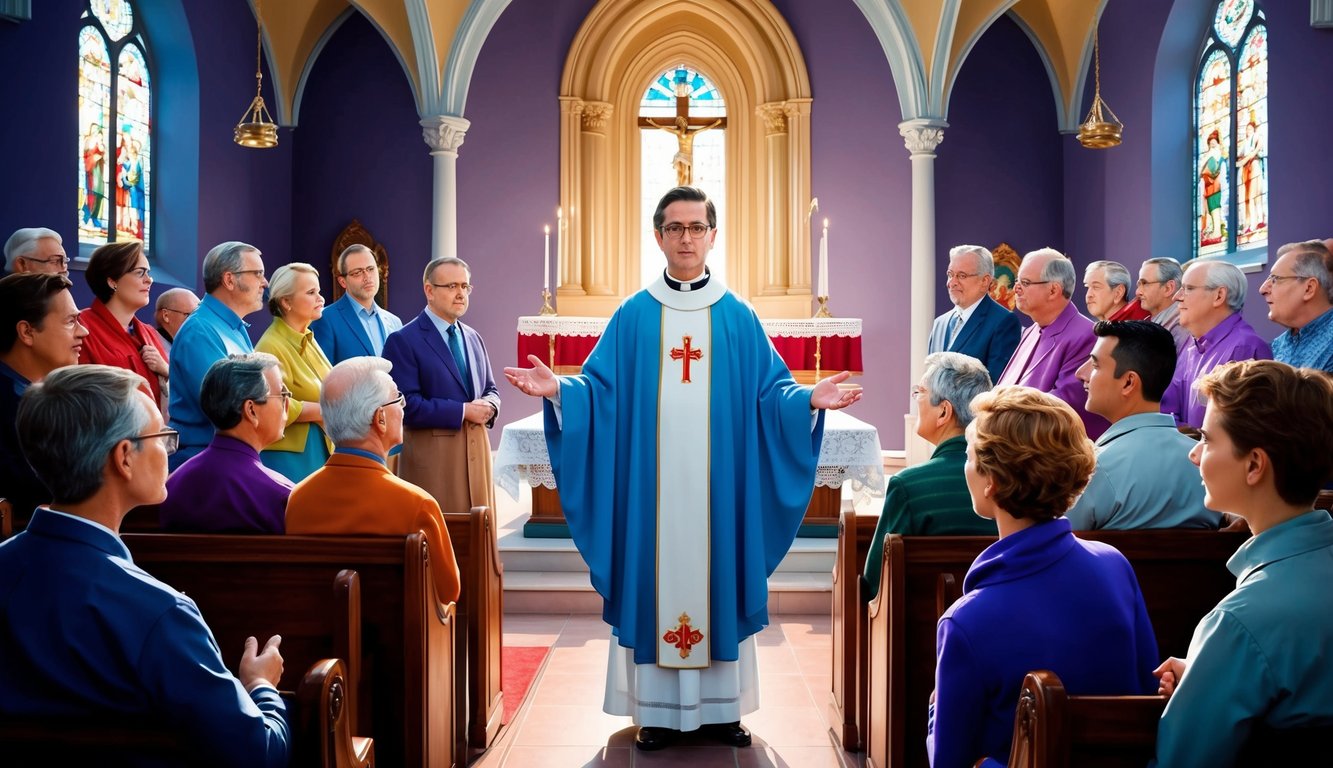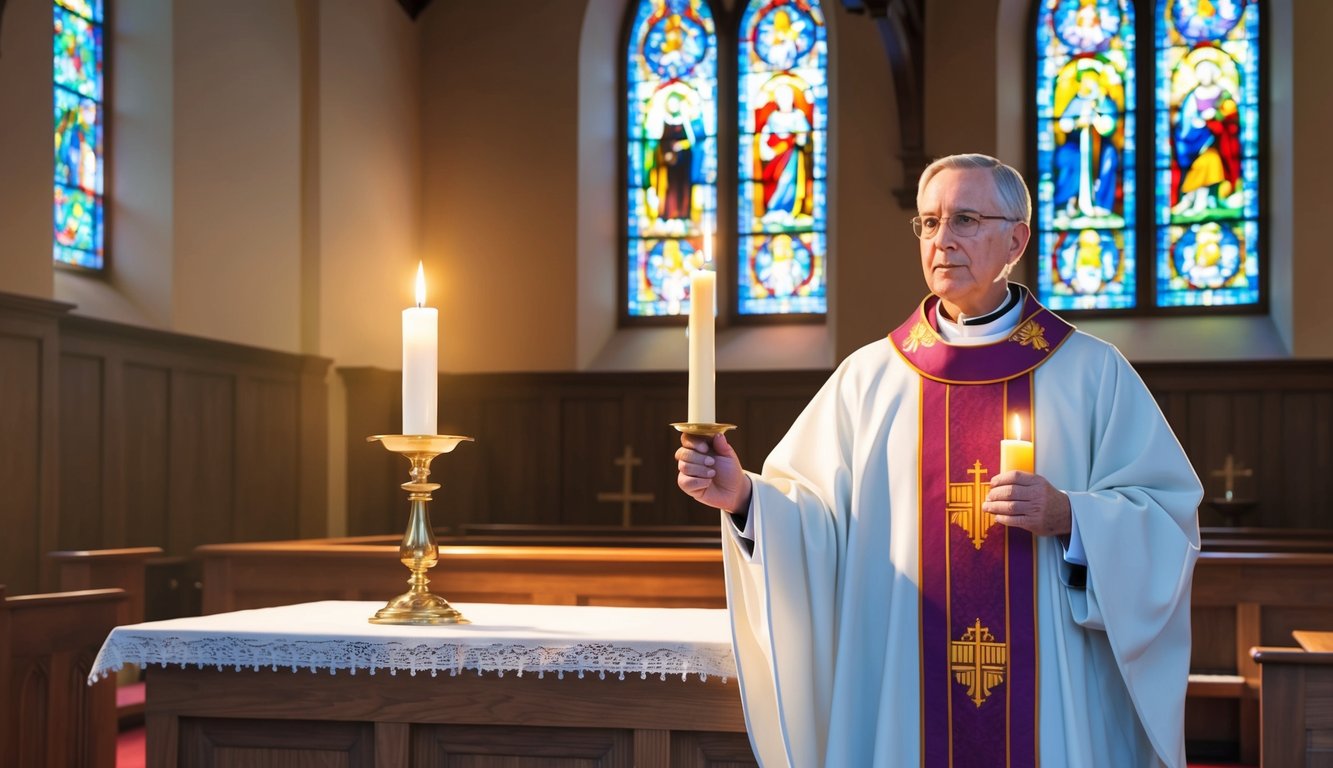Don’t Miss Out On This Unique Astrological Opportunity
Are you tired of spinning your wheels and getting nowhere? Simply put, you’re out of sync: you’re out of alignment with your astral configuration.
But: there’s a kind of map that can help you reclaim your alignment. Think of it as your own personal blueprint to success and happiness: a blueprint that will help you live your most amazing life.
Get started here.
Being a deacon in the Catholic Church means stepping into a role of service and guidance within the community.
Deacons are ordained ministers who help proclaim the Gospel and serve both in the church and the wider community.
Their duties weave through various aspects of church life, including liturgy, charity, and pastoral care.
Understanding the different types of deacons can be intriguing.
In the Catholic Church, some are permanent deacons who serve for life, while transitional deacons are on their way to becoming priests.
Both types involve a special formation process that prepares them for their roles in the church and community.
With roots dating back to biblical times, deacons have evolved to meet the needs of modern congregations.
From participating in Mass to assisting those in need, their work is vital.
Whether you’re thinking about becoming one or just curious, exploring the life of a deacon offers a glimpse into a deeply rewarding path of faith and commitment.
Key Takeaways
- Deacons are key ministers in the Catholic Church, serving in many capacities.
- There are both permanent and transitional deacons, each with specific roles.
- Deacons play a vital role in modern church life, balancing tradition and service.
Roles and Responsibilities
Deacons in the Catholic Church play vital roles that support both the priesthood and community, focusing on service and ministry.
Their duties involve assisting in liturgical celebrations and performing specific sacraments.
Serving the Priesthood and the Community
Deacons act as a bridge between the clergy and the lay community.
You often see them helping priests during Mass, preparing the altar, and making sure that everything runs smoothly.
Besides these liturgical tasks, deacons engage with the community by visiting the sick, offering pastoral care, and coordinating church activities.
Their service is not limited to one area.
Deacons also serve as community leaders, addressing various social issues and assisting those in need.
This role makes them an integral part of the Church’s mission to serve everyone equally.
Ministering through Word and Sacrament
A deacon’s responsibilities include proclaiming the Gospel and occasionally delivering homilies.
You might find them speaking about the Scriptures, connecting the teachings to everyday life.
This role extends beyond words, as deacons also administer certain sacraments.
Deacons perform baptisms, preside at weddings, and lead prayer services.
They play a key part in the Eucharist, assisting with liturgy and offering blessings.
By participating in these sacred rites, deacons enhance the spiritual experience for the community.
These roles show their dedication to both word and sacrament—a cornerstone of their vocation.
Types of Deacons
In the Catholic Church, deacons can be classified into two types: Permanent Deacons and Transitional Deacons.
Each plays a unique role in the church’s ministry and has specific paths in their spiritual journey.
Differences between Permanent and Transitional Deacons
Permanent Deacons are often married men who feel a calling to serve the Church alongside their family commitments.
They are ordained to the diaconate with the intention of remaining in that role for life.
Their primary duties include assisting at Mass, performing baptisms, and helping with community outreach.
Being married does not limit them from fully participating in the liturgical and community life of the Church.
Transitional Deacons, on the other hand, are primarily unmarried and are on their way to becoming priests.
They spend a temporary period in the diaconate, developing their ministry skills before ordination to the priesthood.
Transitional deacons commit to the same responsibilities as permanent deacons but continue their theological studies and formation.
This path focuses on learning the roles of both deacons and priests, enabling a smooth transition into priestly duties later on.
Formation and Ordination

To become a Catholic deacon, you go through a detailed process, which includes training and spiritual preparation, before receiving the Sacrament of Holy Orders.
Both personal commitment and community support play crucial roles.
Journey to Becoming a Deacon
Your journey to becoming a deacon starts with a deep sense of calling.
This is not a decision made lightly.
The Catholic Church emphasizes discernment, where you and the Church community evaluate if this role suits you.
Training, known as formation, involves both academic studies and spiritual guidance.
You’ll study theology, scripture, and pastoral care.
A bishop oversees your progress and supports you through the journey.
If you’re married, your wife’s consent is necessary, showing family support for your commitment.
Once you complete the formation successfully, you are ordained.
This marks your full acceptance into the order of deacons.
The Sacrament of Holy Orders
The Sacrament of Holy Orders is key to becoming a deacon.
This sacrament confers a special grace to serve the Church and its members.
During the ordination ceremony, the bishop lays hands on you and prays for the Holy Spirit.
This sacrament connects you to the ministry of Christ.
As an ordained deacon, you take vows to serve the Church, including preaching, performing baptisms, and helping in liturgical roles.
Your role highlights service to both the Church and the broader community.
Through this sacramental act, you are empowered to be a living sign of Christ’s presence among people.
The Sacrament of Holy Orders grounds you in your faith, guiding your actions as a deacon.
Deacons in the Modern Church

In recent decades, deacons have taken on new roles and responsibilities in the Catholic Church.
They serve as vital links between the clergy and the community, enriching parish life with their unique contributions.
After the Second Vatican Council
The Second Vatican Council opened the door for the revival of the permanent diaconate.
This allowed men, including married men, to become deacons. Permanent deacons serve in roles distinct from priests and are not on a path to becoming priests.
They engage in ministries that include preaching, baptizing, and assisting at liturgies.
This change has allowed for broader participation in the Church’s mission to serve communities and provide pastoral care.
This shift helped address specific needs within parishes, offering support in both spiritual and practical matters.
In addition, they often provide guidance and encouragement to those seeking spiritual growth, drawing from scripture to offer wisdom and reassurance.
Many find comfort in reflecting on Bible verses for a brighter day, using these passages to inspire hope and perseverance.
Through their dedication, they strengthen the faith community and foster a deeper connection to the Church’s teachings.
Deacons in the United States and the World
In the United States, the role of deacons has grown significantly.
The country now has thousands of permanent deacons who assist bishops and priests in dioceses across the nation.
They often work in social service ministries, ensuring outreach in communities and fostering a spirit of charity and justice.
Globally, the diaconate has been embraced differently in various regions.
In Africa and Asia, deacons play critical roles in community-building and engaging with local cultures.
You’ll find deacons involved in educational programs, healthcare initiatives, and promoting peace and justice, highlighting their adaptability and commitment to their calling.
Frequently Asked Questions

Deacons play a vital role in the Catholic Church by serving in various capacities, such as aiding in liturgy and providing service to the community.
They can be married and their duties differ from those of priests.
What qualifications are necessary to become a deacon in the Catholic Church?
To become a deacon, you must feel a calling from God and go through a discernment process.
You receive training and formation.
Requirements typically include being an adult male, a practicing Catholic, and having a recommendation from your local priest.
Can a deacon in the Catholic Church be married, or are they required to take a vow of celibacy?
Yes, a deacon can be married.
If a man is already married when he becomes a permanent deacon, he can remain married.
However, if his wife passes away, he cannot remarry.
Transitional deacons, who plan to become priests, do take vows of celibacy.
What are the primary responsibilities and duties of a deacon in the Catholic Church?
Deacons serve by assisting in the liturgy, preaching the Gospel, administering baptisms, and performing marriages.
They also focus on charity and service activities such as visiting the sick and helping those in need.
Are women allowed to serve as deacons in the Catholic Church, and if not, what are the reasons?
Currently, the Catholic Church ordains only men as deacons.
The reasons relate to longstanding church tradition and teachings.
Discussions and studies are ongoing about the possibility of allowing women to become deacons in the future.
How does the role of a deacon differ from that of a priest within the Catholic Church?
Deacons do not perform the sacraments of Eucharist, Reconciliation, or Anointing of the Sick.
Priests do.
Deacons focus more on service and assisting in liturgical duties.
While both are ordained roles, their responsibilities and functions differ significantly in practice.
Is being a deacon in the Catholic Church considered a full-time profession?
Many deacons serve part-time alongside regular jobs, especially permanent deacons.
They volunteer much of their time to serve the church and community.
Some deacons may engage in full-time ministry if circumstances allow, but it is not a requirement.



